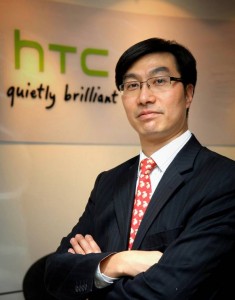 Ray Yam, HTC corporate VP and head of HTC Communication China, presented at the Collide: Powering The China Cloud Conference by TechNode, sharing his broad vision for HTC smartphone and profound insights into mobile cloud computing, which already is an integrated part of the unique experience of HTC smartphones that helps the Chinese android market late comer to stand out from the crowd and to catch up with Motorola and Samsung, two of its biggest competitors in China while Motorola holds an astonishing 50% of Chinese android smartphone market.
Ray Yam, HTC corporate VP and head of HTC Communication China, presented at the Collide: Powering The China Cloud Conference by TechNode, sharing his broad vision for HTC smartphone and profound insights into mobile cloud computing, which already is an integrated part of the unique experience of HTC smartphones that helps the Chinese android market late comer to stand out from the crowd and to catch up with Motorola and Samsung, two of its biggest competitors in China while Motorola holds an astonishing 50% of Chinese android smartphone market.
How could HTC attracts Chinese customers?
To some people’s surprise, there is a disparate array of competitors in many fields in terms of android phone market, computer vendors like Lenovo, telecom equipment manufacturers like HuaWei and ZTE, electrical appliance vendors such as TCL all tapped into the booming area.
According to Ray, HTC’s competitive edge is its perception and understanding of user experience. The company pays close attention to end users in order to understand the way how customers use smartphone which enables the giant mobile device vender to devise intriguing features and combine HTC Sense UI and experience to cater for customer’s tastes.
Limiting factor of cloud: hardware capability
Ray also highlighted that, before cloud computing is prevail, mobile phone has to count on its hardware capability to deliver limited and restricted function and experience. Realized the ubiquitous pitfalls, HTC launched HTCSense.com, its own mobile cloud computing platform and “an extension” of HTC smartphone, to address the concern. With the new hardware, bigger computing power was enabled, including unlimited memory, remote control and management of cellphone, ability to locate your lost phone, remotely upload your secret and important data to HTC cloud server before swiping it off, etc.
All these creative solutions are reliant on HTC’s own cloud computing initiative, which can help HTC stands out and attract more customers.
Strategy in succeeding as a late comer: embracing the e-commerce trends
HTC is well known as the late comer to Chinese smartphone market, which came to China last year, with less distribution capacity compared to Motorola, Samsung and other brands which have been diving into Chinese market for many many years. Ray said that HTC’s solution is embracing e-commerce trends. The company is launching its new official online shop, which is part of its “internet sales” strategy, based on which HTC is going to enhance its online presence with Taobao Mall (to be launch in mid-June), 360buy, Joyo(Amazon China), Gome online shop and Suning online Shop as well. HTC sees internet a more and more important distribution channel for smartphones. Ray told me that we’ll see an increase in HTC’s online marketing efforts as of this June.
On the other hand, HTC is expected to expand its offline sales locations from the currently 500 to 2,000 by the end of this year, in which some 100 of them will be HTC brand store.
HTC comes on stage mostly because of its cooperation with Google over GPhone serials and its aggressive moves in venturing into Android market, but actually, HTC to date is still the biggest partner of Microsoft regarding Windows Mobile system. With the release of brand new Windows Phone 7 mobile OS, Microsoft’s latest effort to take a slice in mobile market, HTC is also releasing Windows Phone 7 phones in Taiwan and Hong Kong area, while in mainland China, an release may rest with whether Windows Phone 7 supports China’s WAPI standard or not.
Related posts:
- Microsoft China Director: Windows Phone Has Chance To Win in 3–5 Years in Mobile
- Cloud Nine for China’s Cloud Computing?
- ZTE Invests Thousands of Human Capital in Cloud Computing
Link to full article






No comments:
Post a Comment